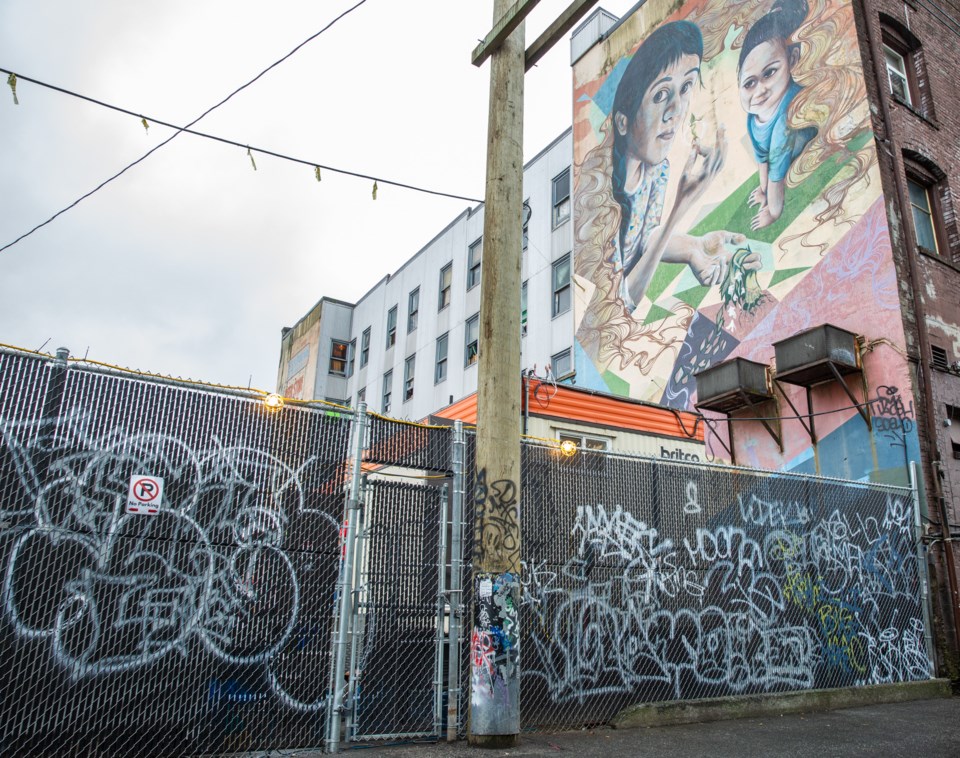Vancouver city council approved a staff recommendation Wednesday to seek $3.8 million from the provincial government to support ongoing and increased washroom access in the Downtown Eastside.
In 2020, the city received funds from senior governments to add washrooms and services for substance users in the Downtown Eastside, which has very few public toilets and a large drug-addicted homeless population.
That money is about to run out.
“Absent additional senior government funding or a corresponding net new investment on the part of the city, these programs will cease operations between December 2023 and March 2024, impacting safe and reliable washroom access, particularly for equity denied groups,” said a staff report that went before council.
The report said the washrooms and services offered at some of the sites are critical to individual and community health and safety, and respond to the ongoing impacts of homelessness, mental health and the overdose crisis.
Almost half of the funding request — $1.55 million — is for the continued operation of a washroom trailer and services for drug users and drinkers of alcohol in a lot adjacent to the Astoria Hotel on East Hastings Street.
The $1.55 million would cover the lease on the property, trailer rental, operating expenses, cleaning, supplies, sewage pumping, maintenance, repairs and wages for staff and peer support workers employed by RainCity Housing.
The site, which has a large tent for shelter, serves as a community hub and averaged 150 to 200 visitors per day in June, according to the staff report. The fenced-off facility was busy Tuesday when Glacier Media visited its entrance in an alley.
Amanda Lagimodiere was leaving the site when told of city staff’s concerns about keeping the washrooms and services operating beyond March 2024.
“It is very necessary, and our people need this in the area because there is nothing that is available to us,” she said, pointing out people without homes often have no choice but to use the streets as a toilet.
“So I would ask very sincerely that they keep the washrooms available to our people.”
The rest of the requested $3.8 million would go to pay for washrooms and services at Main and Hastings, Victory Square, Pigeon Park and a site at 144 East Hastings St., which also offers clean clothing.
“Daily flushes” at the Pigeon Park automated public toilet reached 3,000 in June 2023.
The city also wants to expand its washroom attendant program to spots at Main and Terminal and possibly Powell and Main streets.
Hours at the Victory Square facility would expand from 18 hours per day to 24, if funds are secured; currently, the washroom at Main and Hastings is the only one in the city that is monitored 24 hours per day.
The scale of human waste in the Downtown Eastside, Chinatown and downtown was outlined in a city staff report in January 2022. A program that launched in March 2021 resulted in a two-person non-profit team removing more than 13,000 “feces collections” from the streets in 2021.
Glacier Media contacted the provincial government prior to council’s decision Wednesday to ask whether it would provide the $3.8 million for the washrooms and services.
In an emailed response, the Ministry of Housing pointed to the $1-billion “Growing Communities Fund” it announced to help local governments address population growth. Vancouver received $49.1 million.
“It provides local governments like the City of Vancouver with funding to support needs like expanding the capacity of their current network of public washrooms,” the ministry said.
“Local elected officials engage with people in their communities daily and know best what their communities need, that’s why each local government will determine what infrastructure and community amenities projects the funds will support in their community.”
Of the $49.1 million received by the city, $25.5 million has been dedicated to six projects, including adding a $3-million temporary annex in the Downtown Eastside for firefighters.
Another $10 million will go to converting three temporary public plazas to permanent spaces and using some of the money to complete a turf field at Moberly Park and build a spray park at Ross Park.
City staff is expected within the next eight months to report back to council on what the remaining $23.6 million could be spent on. The staff report to council Wednesday does not identify the “Growing Communities Fund” as a funding source for washrooms.
Though the report focuses on the Downtown Eastside, staff said access to public toilets across Vancouver is “limited,” with only 140 — the equivalent of one for every 5,000 residents. Few are open late, or overnight.
Meanwhile, Premier David Eby announced this week that his government will bring in a legal requirement for flush toilets on all construction sites with 25 workers or more.
“Current conditions are unacceptable and we will take action on that,” Eby posted on X, the social media platform formerly known as Twitter.





